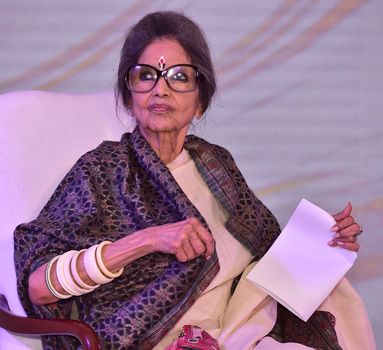I WAS NEARLY 11 when Kasturba died; and nearly 14 when Gandhi died. My views on them are based on my personal contact with them.
She was the witness to Gandhi. They were about 14 when they got married. I sometimes wonder: did it ever strike her that she was marrying a man who would be the man of the century, a legend like the Buddha and Christ? And that life would be a struggle, a sangarsh for truth?
She was a typical Indian rural woman, but not uneducated. She was illiterate, but educated. She saw Gandhi grow. And she grew with him spiritually and logically. At every step, she argued. It was only after argument that she accepted. If she liked it, then she understood it, followed it. She understood his philosophy better than what he did. In a way, she became even stronger in her convictions on Gandhi’s philosophy.
In her last days in the Aga Khan Palace, when we went to visit her, we had to book the compartment. I mean, we travelled by third class. Bapu would be so smiling. I could see his happiness on seeing my father (Devdas Gandhi) and all of us. He had mellowed down and was on a spiritual journey. So was Kasturba. Her main aim was to look after his health all the time.
Whenever we went to the palace, we saw her lying down, very frail. But she also thought of the rights of her family, especially the granddaughters and daughters-in-law. ‘If people give something, why should I not have them for my daughter-in-law?’ She gave me a sari. It had very nice embroidery: red, green, yellow, orange. I wore it so often in my college.
I took that sari very naturally from Kasturba but I knew what my grandfather would say: it should not go to her; it should go to the last person, to the needy.
So I was hugging the sari and trying to run out of the jail, but then I looked at him. He smiling and spinning his yarn. It meant: ‘it is yours.’ And I understood the meaning of ‘really needy person’. One is needy for food, a roof, clothes. Sometimes you need love. I was a needy person and she was in need of giving it to her granddaughter.
There are pictures of her washing his feet. She did not see it as slavery. You bend down because you have the dignity. You have the courage to do that. She was that.
She looked after his food and everything. My mother said something which she could only share with me. I am a daughter in the family. My mother was a daughter-in-law. She could not say it openly. She could not share it with my father. She said to me: ‘Ba ke jaane ke baad Bapu anaat ho gaye. Unke kapde itne saaf nahi hai, unke khaane ka dhyan itna kisi ne nahi diya aur unke aaraam ka bhi. I am not saying this because no one is looking after him. They are, with all their heart. But it is like he has been orphaned.’
My mother had tears in her eyes when she said so. There is a combination of mother and father in every person, in a friend, in a husband, in a father. There is a mother in the father. There is a father in the mother. And later on the children become like your parents. She had the role of a mother, of a colleague, of a co-worker, and of a co-satyagrahi. She could not read and write, but she was educated. Bapuji tried very hard to teach her. This is Kasturba as I saw it. There were many times that we went to Sevagram and could not see Bapu, but we saw Ba and it almost made up for it. She became the mother of the nation even before he became the father. In a way, not in a formal way.
They had an equal relationship. She accepted bramacharya when he said that. And what she said was the courage in her heart, self willed and her understanding of Gandhi’s philosophy. She did not want Gandhi to fail in his experiments.
When she was in prison in the Aga Khan Palace I said to her: ‘Ba, I want to go and play in that room. There is no guard there.’ She said, ‘No, it’s not allowed.’ There was a profound message: self-control. On one of her visits to Kingsway Camp she said, ‘Tomorrow I have to go to a meeting.’ She used to be invited to speak. She was a public figure. She was called to speak at a congregation in Hapur. And she said, ‘My granddaughter will come with me.’ We left in the car in the wee hours of the morning. There was a big stage for her. She went up, with me holding her hand. I kept saying, ‘I am hungry.’ She said, ‘Keep quiet.’
There was a centre seat for her. But she took a corner seat. I shared it with her. I don’t remember how she said a few words. There were no big words; only the spirit of Gandhi. When the meeting was over, she said, ‘My child is very hungry. Please give her something.’ I remember it very well.
—As told to Mandira Nayar
Tara Gandhi is Kasturba’s granddaughter


